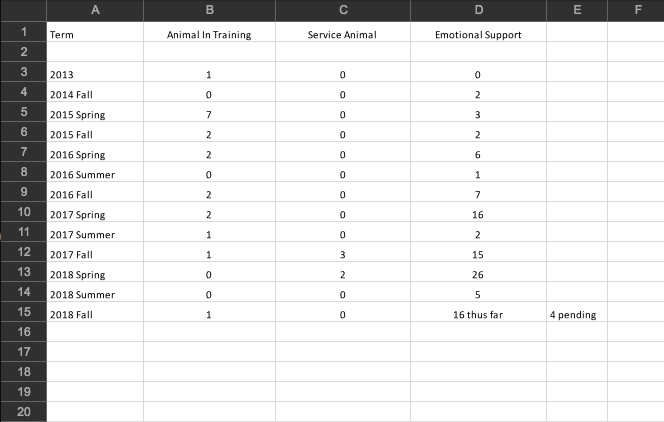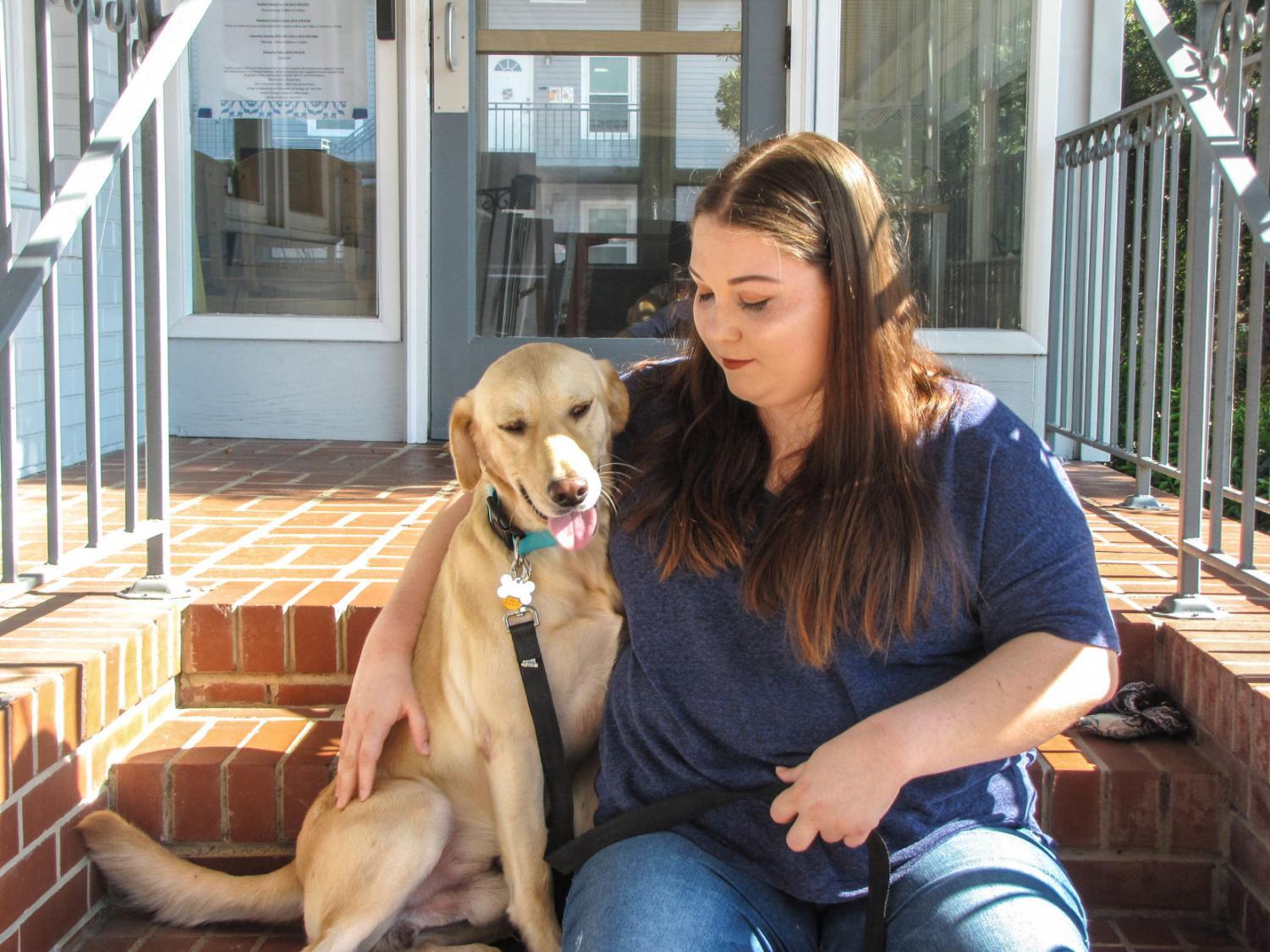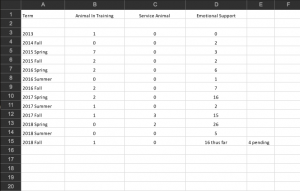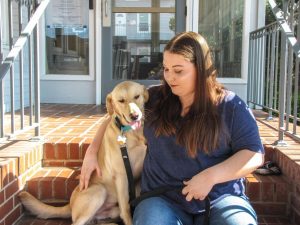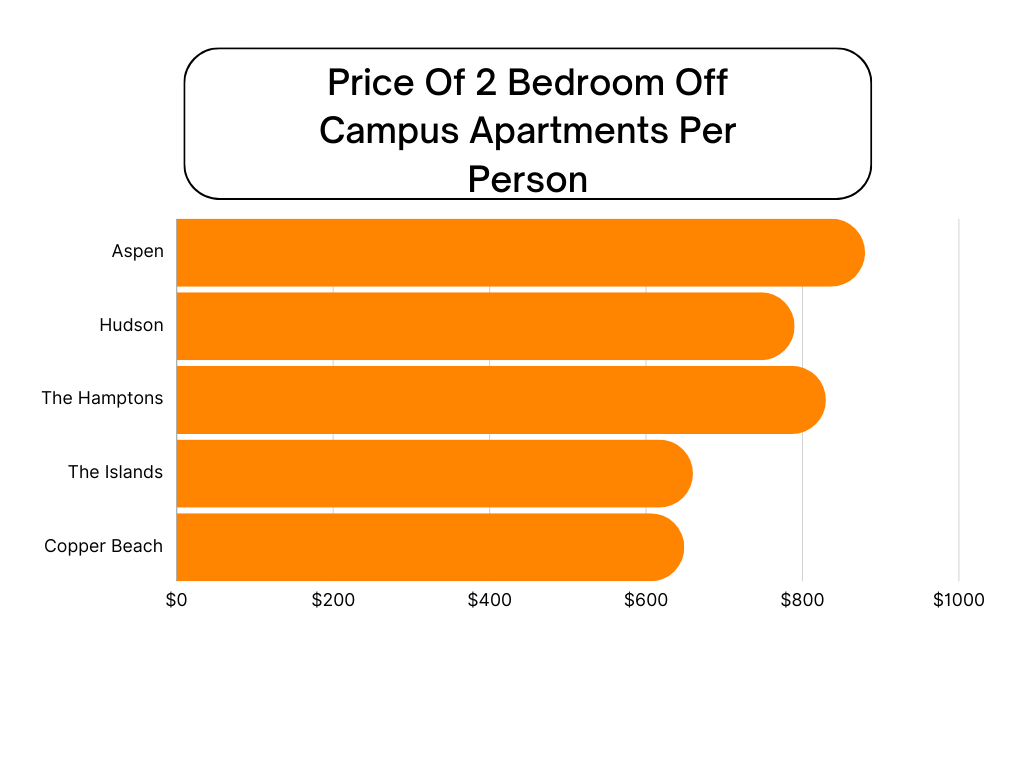Number of emotional support animals on the rise at Georgia Southern
October 4, 2018
The number of emotional support animals being registered on college campuses is on the rise, and Georgia Southern University is no exception.
According to records obtained by the GS records department, Spring 2018 saw the largest number of emotional support animals in the residence halls since 2013. Twenty-six emotional support animals and two service animals made one of eight Statesboro campus residence halls their home last year.
The first emotional support animals were admitted to GS in Fall of 2013, according to an email sent by Peter Blutreich, executive director of University Housing.
Housing and the Student Accessibility Resource Center, previously known as the Student Disability Resource Center, often work together when it comes to reviewing applications for emotional support animals.
“University Housing works to provide a safe and comfortable living environment for all our students on campus,” Blutreich said in an email. “We want to set the foundation for students’ success when students live with us on campus.”
Though there is not one set place for students with emotional support animals to live on either campus, Blutreich said that all of the halls are equipped for students with emotional support animals.
“We do not do anything for students that bring emotional support/service animals that we do not do for all our students,” Blutreich said in an email.
Some halls might have more students residing inside of them with their emotional support animals because of better access to outside areas or less stairs.
Better together
Kayleigh Heard, sophomore psychology major, lives in University Villas with her emotional support animal, a dog named Sunny. This is Heard’s first year having her animal on campus.
“I got Sunny because I didn’t want to hole myself up in my dorm room and not get out,” Heard said. “I mainly got [Sunny] so I wouldn’t isolate myself and it has worked tremendously.”
Sunny has forced Heard to become more social and interact more with her surroundings. Heard said she got Sunny not because she had a schoolwork problem, but a mental health and socialization problem.
When it came to getting Sunny registered to live on campus with her, Heard said the process was simple. After expressing interest in living with an emotional support animal, Housing instructed her to get a letter from her therapist outlining why having an emotional support animal would help her at school.
“My therapist wrote up a letter and basically the letter included things like why specifically a dog would be a good fit, what kinds of issues I was having, how a dog would alleviate those issues, stuff like that,” Heard said.
Once the letter was sent to the SARC, Housing approved it within a week, Heard said. She does warn against students trying to register their pets as emotional support animals just to have them with them while away from home.
“I don’t think that people understand that you can’t just go and get any animal and get it classified. You don’t need to abuse the system,” Heard said.
Here to help
The SARC is a one-stop shop for all things dealing with accessibility, including emotional support animals. According to Kelly Woodruff, director of the SARC, that’s why most students come to the center.
“A lot of times, many of the students who request an ESA, that’s all they want from our office,” Woodruff said. “Now, occasionally, we get students who would also like test accommodations, but the vast majority of students who ask for an ESA, that’s all they want.”
Emotional support animals are often dogs and cats, but they can also be lizards, mice, rabbits and even a chameleon. The only animals that are not allowed to be in housing are animals classified as exotic by the Georgia Department of Natural Resources, according to Woodruff.
“Some people don’t understand how maybe a lizard could provide support, but for someone who has a pet, whatever animal they prefer, that’s what they need,” Woodruff said.
The SARC doesn’t have a minimum or maximum amount of emotional support animal or student applications that they have to see a year. Woodruff encourages anybody who is interested in emotional support animal accommodations or any other accommodations to reach out to the office.
{{tncms-inline content=”<p>&ldquo;Some people don&rsquo;t understand how maybe a lizard could provide support but for someone who has a pet, whatever animal they prefer, that&rsquo;s what they need."</p>” id=”b23fa726-c8a2-47fe-b7af-623e4d1e01e4″ style-type=”quote” title=”Kelly Woodrff, Director of the Student Accessibility Resource Center” type=”relcontent”}}
In most cases, applications for emotional support animals are approved in a day or two. The most common reason why applications are rejected is because the letters from doctors or therapists are too vague.
“A doctor can’t just write, ‘This person has a medical condition.’ We have to actually know what the issue is that we’re accommodating,” Woodruff said.
The puppy raising club
The SARC and University Housing aren’t the only places on campus dealing with emotional support and service animals. The Service Dog Training and Education Program takes the idea of raising puppies a step further by raising them to be service animals.
{{tncms-inline content=”<p>&ldquo;People think that emotional support animals are the same as service dogs and they&rsquo;re not."</p>” id=”7da78623-a03c-48a8-ad39-1efee73f99b7″ style-type=”quote” title=”Iesha Murphy” type=”relcontent”}}
Part of STEP’s mission is to help spread awareness about service animals on GS’ campus, as well as be a safe haven for students with these animals. The club was founded last spring, according to Angel Tumminello, president of STEP.
They saw the potential for a club after their social media chair, Victoria Rhodes, raised Harbin through Southeastern Guide Dogs. STEP also works with Canine Companions for Independence.
“We realize the importance of therapy animals as well as emotional support animals. We try to educate the public on all the different types [of animals] and what their purposes are and their rights are,” Tumminello said.
According to Tumminello, another part of STEP is explaining the importance of all assistance animals, from emotional support animals to service animals.
STEP’s upcoming “Barking in the Boro” event on Oct. 13 is one of the places where the club hopes to get the word out about not only their organization but about all types of assistance animals.
“People think that emotional support animals are the same as service dogs and they’re not,” Iesha Murphy, vice president of STEP, said. “They think that they can have their emotional support animal certified as a service dog so they can take it to different places. You can’t do that.”

